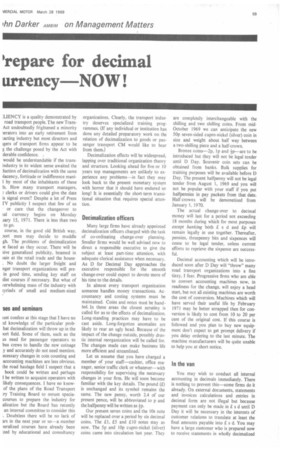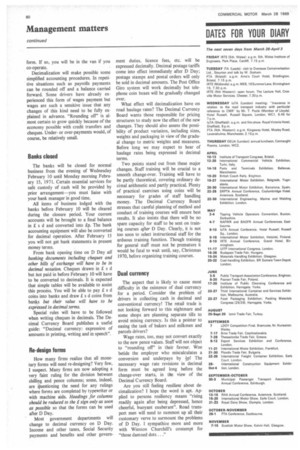rep are for decimal urrency—NOW!
Page 61

Page 62

If you've noticed an error in this article please click here to report it so we can fix it.
LIENCY is a quality demonstrated by road transport people. The new TransAct undoubtedly frightened a minority mrators into an early retirement from :acting industry but most directors and igers of transport firms appear to be g the challenge posed by the Act with derable confidence. .
would be understandable if the transindustry in its widest sense awaited the luction of decimalization with the same Ilacency, fortitude or indifference maniI by most of the inhabitants of these Is. How many transport managers, ; clerks or drivers could give the date is signal event? Despite a lot of Press TV publicity I suspect that few of us or care that the changeover to 'al currency begins on Monday Jary 15, 1971. There is less than two to go.
course, in the good old British way, )ort men may decide to muddle gh. The problems of decimalization )e faced as they occur. There will be sive generalized publicity, beamed in rain at the retail trade and the house. No doubt the larger freight and nger transport organizations will prein good time, sending key staff on rust courses if necessary. But what of ierwhelming mass of the industry with tyriads of small and medium-sized
ses and seminars
lust confess at this stage that I have no xl knowledge of the particular prob hat decimalization will throw up in the port field. Some of them, such as the us need for passenger operators to bus crews to handle the new coinage y and accurately do not need mention.
ecessary changes in coin counting and accounting machines are less obvious.
the road haulage field I suspect that a book could be written and perhaps I be written to acquaint operators with likely consequences. I have no knowof the plans of the Road Transport my Training Board to mount speciacourses to prepare the industry for alization but the Board has recently an internal committee to consider this . Doubtless there will be no lack of ars in the next year or so—a number teralized courses have already been zed by educational and consultancy
organizations. Clearly, the transport industry deserves specialized training programmes. (If any individual or institution has done any detailed preparatory work on the relation of decimalization to goods or passenger transport CM would like to hear from them.) Decimalization effects will be widespread, lapping over traditional organization theory and structure. Looking ahead for five or 10 years top managements are unlikely to experience any problems—in fact they may look back to the present monetary System with horror that it should have endured so long! It is essentially the short-term transitional situation that requires special attention.
Decimalization officers
Many large firms have already appointed decimalization officers charged with the task of co-ordinating change-over planning. Smaller firms would be well advised now to direct a responsible executive to give the subject at least part-time attention, with adequate clerical assistance when necessary. As D for Decimal Day approaches the executive responsible for the smooth change-over could expect to devote more of his time to the details.
In almost every transport organization someone handles money transactions. Accountancy and costing systems must be maintained. Coins and notes must be handled. In these areas the closest scrutiny is called for as to the effects of decimalization. Long-standing practices may have to be cast aside. Long-forgotten anomalies are likely to rear an ugly head. Because of the impact of the change outside, possibly drastic internal reorganization will be called for. The changes made can make business life more efficient and streamlined.
Let us assume that you have charged a member of your staff—cashier, office manager, senior traffic clerk or whatever—with responsibility for supervising the necessary changes in your firm. He will soon become familiar with the key details. The pound (I) is unchanged and its symbol remains the same. The new penny, worth 2.4 of our present pence, will be abbreviated to p and the halfpenny will be written as fp.
Our present seven coins and the lOs note will be replaced over a period by six decimal coins. The £1, £5 and £10 notes stay as now. The 5p and 10p cupro-nickel (silver) coins came into circulation last year. They are completely interchangeable with the shilling and two shilling coins. From midOctober 1969 we can anticipate the new 50p seven-sided cupro-nickel (silver) coin in size and weight about half way between a two-shilling piece and a half-crown.
Bronze coins-2p. lp and 4p—are to be introduced but they will not be legal tender until D Day. Souvenir coin sets can be obtained from banks. Bulk supplies for training purposes will be available before D Day. The present halfpenny will not be legal tender from August 1, 1969 and you will not be popular with your staff if you put halfpennies in pay packets from that date. Half-crowns will be demonetized from January 1, 1970.
The actual change-over to decimal money will last for a period not exceeding 18 months during which for most purposes
except banking both s d and £p will remain legally in use together. Thereafter, pennies, threepenny bits and sixpences will cease to be legal tender, unless current efforts to reprieve the sixpence are successful.
Decimal accounting which will be introduced soon after D Day will "throw" many road transport organizations into a fine tizzy, I fear. Progressive firms who are able to convert accounting machines now, in readiness for the change, will enjoy a head start, but not all existing machines are worth the cost of conversion. Machines which will have served their useful life by February 1971 may be better scrapped then for conversion is likely to cost from 10 to 20 per cent of the original cost. If this course is followed and you plan to buy new equipment don't expect to get prompt delivery if you delay ordering to the last minute. The machine manufacturers will be quite unable to help you at short notice.
In the van
You may wish to conduct all internal accounting in decimals immediately. There is nothing to prevent this—some firms do it already. On external documents, statements and invoices calculations and entries in decimal form are not illegal but because payment can only be made in £ s d until D Day it will be necessary in the interests of customer relations to translate at least the final amounts payable into £ s d. You may have a large customer who is prepared now to receive statements in wholly decimalized form. If so, you will be in the van if you co-operate.
Decimalization will make possible some simplified accounting procedures. In repetitive situations such as payrolls payments can be rounded off and a balance carried forward. Some drivers have already experienced this form of wages payment but wages are such a sensitive issue that any changes of this kind need to be fully explained in advance. "Rounding off" is almost certain to grow quickly because of the economy possible with credit transfers and cheques. Underor over-payments would, of course, be relatively small.
Banks closed
The banks will be closed for normal business from the evening of Wednesday February 10 until Monday morning February 15, 1971. Certain essential services for safe custody of cash will be provided by prior arrangement—you must liaise with your bank manager in good time.
All items of business lodged with the banks before February 10 will be cleared during the closure period. Your current accounts will be brought to a final balance in s d and converted into fp. The bank accounting equipment will also be converted for decimal operation. After February 15 you will not get bank statements in present money terms.
From bank opening time on D Day all banking documents including cheques and other bills of exchange will have to be in decimal notation. Cheques drawn in f s d but hot paid in before February 10 will have to be converted to decimals. It is expected that simple tables will be available to assist this process. You will be able to pay £ s d coins into banks and draw £ s d coins from banks but their value will have to be expressed In decimal terms.
Special rules will have to be followed when writing cheques in decimals. The Decimal Currency Board publishes a useful guide: "Decimal currency: expression of amounts in printing, writing and in speech".
Re-design forms
How many firms realize that all monetary forms will need re-designing? Very few, I suspect. Many firms are now adopting a very faint ruling for the division between shilling and pence columns; some, indeed, are questioning the need for any rulings where forms are completed by typewriter or with machine aids. Headings for columns should be reduced to the £ sign only as soon as possible so that the forms can be used after D Day.
Most government departments will change to decimal currency on D Day. Income and other taxes, Social Security payments and benefits and other govern
ment duties, licence fees, etc. will be expressed decimally. Decimal postage tariffs come into effect immediately after D Day; postage stamps and postal orders will only be sold in decimal amounts. The Post Office Giro system will work decimally but telephone coin boxes will be gradually changed over.
What effect will decimalization have on road haulage rates? The Decimal Currency Board wants those responsible for pricing structures to study now the effect of the new changes. They should also assess the possibility of product variation, including sizes, weights and packaging in view of the gradual change to metric weights and measures. Before long we may expect to hear of haulage rates being expressed in decimal terms.
Two points stand out from these major changes. Staff training will be crucial to a smooth change-over. Training will have to be partly theoretical, covering ordinary decimal arithmetic and partly practical. Plenty of practical exercises using coins will be necessary for grades of staff handling money. The Decimal Currency Board stresses that careful planning of method and conduct of training courses will ensure best results. It also insists that there will be no spare capacity for staff to be sent on training courses after D Day. Clearly, it is not too soon to select instructional staff for the arduous training function. Though training for general staff must not be premature it would be fatal to wait until, say, Christmas 1970, before organizing training courses.
Dual currency
The aspect that is likely to cause most difficulty in the existence of dual currency for a period. Consider the problem of drivers in collecting cash in decimal and conventional currency! The retail trade is not looking forward to this nightmare and some shops are planning separate tills to avoid mixing currency. Is this a pointer to easing the task of bakers and milkmen and parcels drivers?
Wage rates, too, may not convert exactly to the new pence values. Staff will not object to "rounding off" in their favour. Woe betide the employer who miscalculates a conversion and underpays by fpl The necessary wage rate revisions in decimal form must be agreed long before the change-over starts, in the view of the Decimal Currency Board.
Are you still feeling resilient about decimalization? I hope the word is apt. Applied to persons resiliency means "rising readily again after being depressed, hence cheerful, buoyant exuberant". Road transport men will need to summon up all their customary verve to surmount the problems of D Day. I sympathize more and more with Winston Churchill's contempt for "those damned dots ..."










































































































